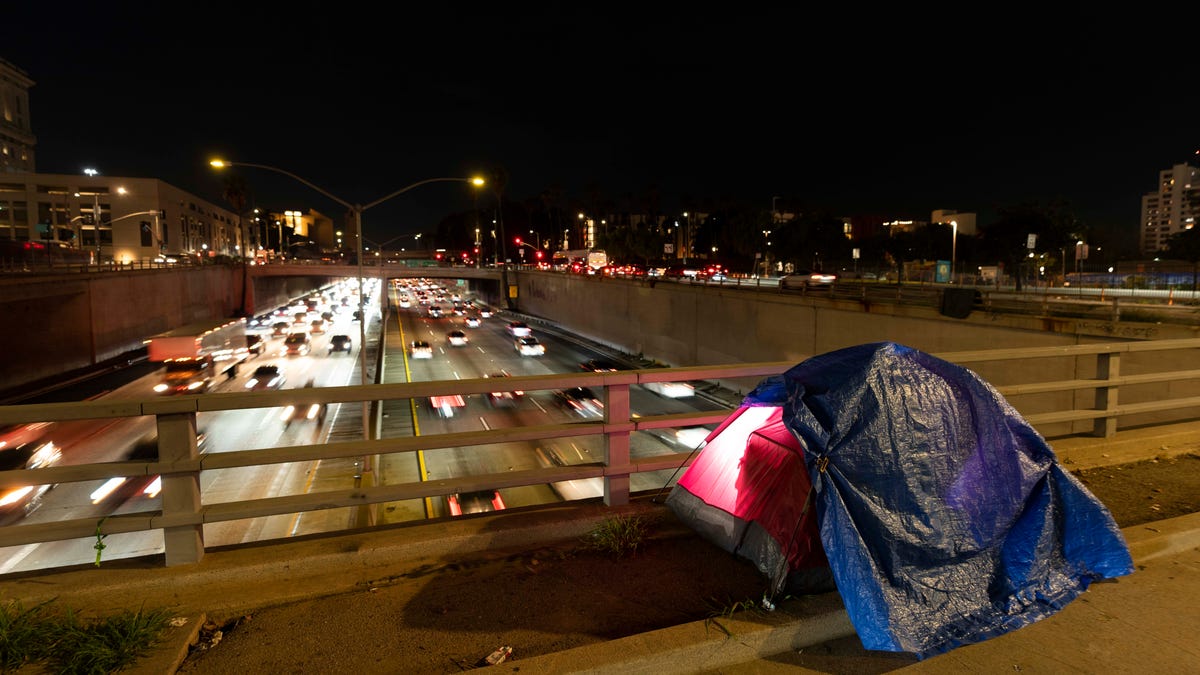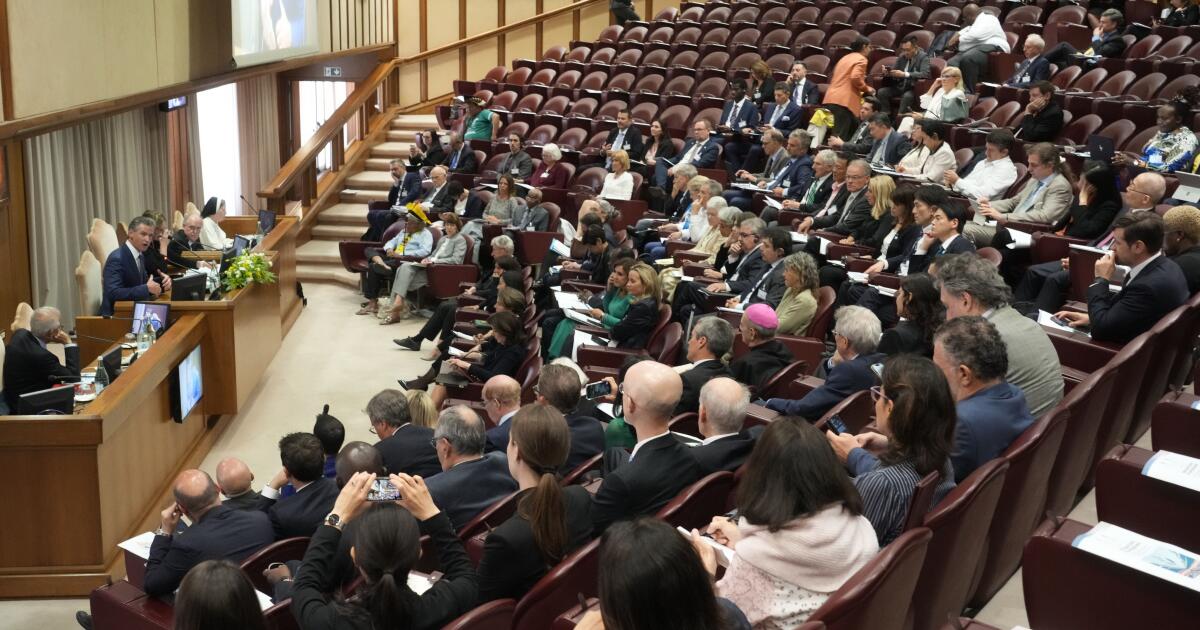Michigan
Biannual count of homeless people to bring federal funds to southeast Michigan

Detroit — Despite freezing temperatures that made it hard to locate people living on the streets, advocates for the homeless searched southeast Michigan communities last month in an effort to count those in need to draw in critical federal funds.
Volunteers joined the Homeless Action Network of Detroit for the point-in-time count on Wednesday night in Detroit. About 120 volunteers, fanned out across the Motor City, spreading out in teams, canvassing several neighborhoods to survey people facing homelessness, leaders said.
Volunteer Ronnika Harris of Detroit is careful about approaching homeless people too stridently to seek information about their situations. She wants them to trust that she has their interests in mind.
“Just being welcoming, being open and not judgy,” Harris said of her approach. “Explaining why we’re doing what we’re doing and giving them as much information that we can to get them to open up. It’s not always easy, but people see and feel your heart, so if you display the right heart, usually they will share their stories.”
Braving the cold in 2021 to find unsheltered people was worth it, Harris said, even though her team of three only found two people. This year she hopes for better results with the Homeless Action Network of Detroit.
“The first time I participated was two years ago and it was still during COVID-19…and we didn’t find a lot of people outside,” Harris said of the four-hour search. “So I’m just hoping to be able to engage more people this year and see if we can get them in shelter.”
The bi-annual count, a requirement of the U.S. Department of Housing and Urban Development, is designed to collect information to draw federal funding for Michigan’s largest city. It takes place the last 10 days of January.
Street outreach workers, homeless service providers and volunteers collected information about those living on the streets, including their stories, and offered to provide them with shelter, leaders said. Volunteers carried new winter hats and scarves, thermal blankets, gloves and mittens, socks and personal hygiene kits and handed them out.
“Ultimately, this is data we report to HUD, and it helps all communities across the country, which are doing the point-in-time count this month,” said Amanda Sternberg, a performance management analyst for Homeless Action Network of Detroit. “HUD uses this data from across the country to report to Congress, to set funding levels, so it’s really data that the federal government uses to drive funding allocations.”
Sternberg said the information helps local governments and organizations in Detroit to understand such needs as mental health and substance abuse services, or affordable housing.
In a 2021 report, the Homeless Action Network of Detroit and the Detroit Continuum of Care, a year-round planning body of stakeholders working to end homelessness in Detroit, Hamtramck and Highland Park, found more than 5,600 people facing homelessness in Detroit.
The count, Sternberg said, happens at night because they’ve found someone in the streets at night during the winter likely has no place to go.
“The one thing that I hear often from our street outreach workers is it takes a lot of time to build trust with people who have been staying unsheltered for a long time,” she said. “So we have staff day-in-and-out doing this hard work every day, building trust with folks and getting them to engage in services.”
In Detroit, the weather on Wednesday was warmer compared to past count periods, which volunteers were hoping would affect their ability to spot unsheltered populations. Temperatures on Wednesday were above average around 41, according to National Weather Service records.
Richard Monocchio, principal deputy assistant secretary at HUD, said every year, housing programs are awarded funds and resources from the federal government based on innovative programs that seek to serve homeless populations.
Programs are those that “build permanent supportive housing … build transitional housing for the homeless, they run shelter and food programs for homeless people, they run job training and placement programs … and critically provide rental assistance,” Monocchio said.
HUD announced in October that it allocated 70,000 housing vouchers to local public housing authorities through the Emergency Housing Voucher program to help individuals and families who are homeless, at-risk of homelessness and other destabilizing situations, according to its website.
The Biden administration awarded $3.16 billion in homelessness assistance to communities across the nation, according to a news release HUD on Monday.
“This Point-in-Time Count is sort of symbolic and important for everything we do at HUD in the homeless space,” Monocchio said, adding that 400 counts occurred throughout the nation in January. In Michigan, 20 communities participated in the count, he said.
Meanwhile, in Macomb County, the state’s third most populous county, dozens of volunteers conducted a count on Jan. 28 with Macomb Community Action, a member of a national network of organizations that helps people move from poverty to economic stability.
Volunteers were assigned ZIP codes and “hot spots” such as parks and bus stops to gather information, including gender, race, ethnicity, veteran status, age and disabilities. Volunteers sought to identify if a person was “chronically homeless” or was experiencing homelessness due to domestic violence or substance use, leaders said.
Macomb County Executive Mark Hackel described the count as essential.
“It provides support to individuals in our society that sometimes get left behind,” Hackel said last month.
Food, hand warmers, winter clothing, hygiene kits, blankets, fast-food gift cards and bus tickets were handed out, Macomb Community Action leaders said. Local charities donated the items.
Kristin DeFranco, program coordinator for housing resources at Macomb Community Action, said in 2021, the numbers stayed stagnant from the previous count of those experiencing homeless.
“The pandemic time was difficult because a lot more people were becoming homeless due to evictions and job loss,” DeFranco said. “Macomb County in particular, the numbers haven’t changed. If anything we need more resources for the homeless.”
jaimery@detroitnews.com

Michigan
Michigan budget plan includes unexpected $235M in extra income

LANSING, Mich. (FOX 2) – It was a boring day for those coming up with Michigan’s next budget – which is exactly how the state treasurer likes it.
It’s “good for forecasting revenues and finalizing a budget,” said Rachael Eubanks.
Eubanks, along with the government’s other top bean counters gathered Friday to work on finalizing the annual budget for Michigan in the upcoming fiscal year.
“Tax collections are strong. Corporate income tax, income tax withholding, and interest earnings are strong. Economic growth and higher wages are leading to higher income tax collections,” said Eubanks during a Zoom meeting.
She said individual spending was up and wage increases were outpacing inflation – both good indicators of a healthy economy.
“Our labor force is at its strongest since 2001,” said Eubanks.
The good news doesn’t stop there. Since last January, the state coffers have grown by $235 million dollars, which state officials were not expecting.
That’s for lawmakers to spend as they compose the new state budget. The process has included criticism from Republicans, specifically from Senate Minority Leader Aric Nesbitt (R-Porter Township) who accused Democrats of “squandering the state’s $9 billion budget surplus on pet projects and corporate handouts in 2023.”
He also claimed the governor had raided the teacher pension fund to pay for her education budget.
While rare, it’s not outside of the possibility the state budget director would take a political shot at any lawmaker. But on Friday, Jen Flood did just that.
“The minority leader has a new found support for teachers and retirees it seems because his votes earlier on in his career cut funding for schools and taxpayers,” she said.
Despite concerns about the financial hit that electric vehicles could impose upon U.S. automakers, the state treasurer didn’t believe it would impact Michigan revenue streams for now.
“I don’t think that’s a troublesome point yet,” Eubanks said. “We’ve seen really strong profit-sharing happen with the major car makers and while there is that potential risk on the horizon, its not something se can see today.
Lawmakers will try to have a finished state budget by the end of June.
Michigan
Michigan State football gets its own cross-state transfer in ex-U-M LB Semaj Bridgeman

New Michigan State football defensive coordinator Joe Rossi on spring
New Michigan State football defensive coordinator Joe Rossi breaks down the Spartans’ first scrimmage of spring practice and how his unit looks.
Michigan State Athletics
As if the instability of the NCAA’s transfer portal era hasn’t already overtaken college sports, particularly football, Friday night it reached a new level.
Michigan State football and Michigan made a virtual trade.
Shortly after losing starting safety Jaden Mangham to the rival Wolverines, the Spartans picked up a commitment from U-M transfer linebacker Semaj Bridgeman.
The 6-foot-2, 246-pound native of Philadelphia has all four years of eligibilty remaining after taking a redshirt during the Wolverines’ College Football Playoff championship season last fall. Bridgeman was a four-star recruit and the nation’s No. 300 overall player and No. 23 linebacker in the 2023 class, according to 247 Sports’ composite ratings.
OFFSEASON CHEAT SHEET: Can’t keep up with Michigan State football roster moves?
MSU faces U-M on Oct. 26 in Ann Arbor.
Bridgeman is new Spartans coach Jonathan Smith’s 24th incoming transfer since being hired in late November and 12th addition since spring practice ended April 20. He was the third player Friday to pledge to play this fall in East Lansing, along with safety Nikai Martinez (Central Florida) and cornerback Jeremiah Hughes (LSU).
With the Spartans, Bridgeman joins a linebacker room that continues to stockpile depth and talent under new defensive coordinator Joe Rossi.
Jordan Turner (Wisconsin) and Wayne Matthews III (Old Dominion) arrived in January as transfers, joining senior stalwart Cal Haladay, rising sophomore Jordan Hall, veteran Darius Snow and true freshman early enrollee Brady Pretzlaff during spring practice. MSU also picked up pledges in the past month from Marcellius Pulliam of Miami (Florida) and landed commitments from two of the state’s best linebackers for 2025 in Charles “DJ” White from Orchard Lake St. Mary’s and DiMari Malone from Macomb Dakota.
Contact Chris Solari: csolari@freepress.com. Follow him @chrissolari.
Subscribe to the “Spartan Speak” podcast for new episodes weekly on Apple Podcasts, Spotify or anywhere you listen to podcasts. And catch all of our podcasts and daily voice briefing at freep.com/podcasts.
Michigan
Michigan Democrats allege signature fraud by GOP Senate candidates, call for investigation
Washington — Michigan Democrats are alleging fraudulent signatures and calling for an investigation into the nominating petitions for Republican U.S. Senate candidates, according to a complaint filed Friday.
The complaint to the Michigan Board of State Canvassers follows “an initial and limited review” of the petitions and specifically names four candidates: Former U.S. Reps. Mike Rogers of Brighton, Justin Amash of Cascade Township and Peter Meijer of Grand Rapids Township as well as Grosse Pointe businessman Sandy Pensler. Meijer withdrew from the race in late April.
“The apparent fraud uncovered demands an immediate investigation of the Republican Senate candidates’ nominating petitions,” said Lavora Barnes, Michigan Democratic Party chair.
Complaints like the Democratic Party’s have become commonplace in recent years, in many instances leading to the removal of Democratic and Republican candidates from the ballot. If this latest complaint is substantiated, it could upend a crowded GOP primary Senate contest set for August.
The Board of State Canvassers is comprised of two Republicans and two Democrats.
But at least one Republican campaign accused the Democrats of playing politics.
“Democrats can’t beat Republicans at the ballot box, so it looks like they are trying to eliminate Republicans from the ballot. Sandy Pensler turned in over 26,000 signatures. He clearly qualifies for the ballot which is why no timely challenge was filed,” said Stu Sandler, a spokesperson for Pensler, a Grosse Pointe Park businessman seeking the GOP nomination.
The complaint, filed by the Elias Law Group, alleged “at least five” markers of fraudulent signatures by the GOP candidates:
- “Clear, full page circulator fraud with evidence that all lines of the petition were filled out by the same person.
- Voters’ names appearing across multiple candidates’ petitions in different handwriting with errors in addresses and spelling.
- Voters’ names appearing within a single candidate’s petition more than once, in different handwriting with errors in addresses and spelling.
- Evidence of a “round-robin” scheme, which refers to instances of signature gatherers for different campaigns taking turns signing candidates’ petitions from names on a voter list.
- Visible circulator handwriting and signature mismatches.”
The Democratic Party explained why Meijer was named in the complaint even though he dropped out of the race.
“Although Mr. Meijer has suspended his campaign, we believe the Board should know the full extent of potential fraud across these four candidates’ nominating petitions,” the complaint said.
“There is a well-documented history of significant fraudulent signatures on Republican nominating petitions in Michigan. In the 2022 election cycle, five gubernatorial candidates and three judicial candidates were not certified to appear on the ballot due to fraudulent signatures,” the Democratic Senatorial Campaign Committee said in a press release.
Look back: James Craig, Perry Johnson, 3 others ineligible for ballot, Bureau of Elections says (2022)
On the Democratic side, elections staff at the Wayne County Clerk’s Office determined Thursday that Democratic U.S. House candidate Adam Hollier of Detroit did not have enough valid voter signatures to qualify for the ballot in the 13th Congressional District. That came after first-term Democratic U.S. Rep. Shri Thanedar of Detroit, challenged the signatures Hollier’s campaign collected.
The county staff recommendation isn’t final, as an official determination hasn’t yet been made by Wayne County Clerk Cathy Garrett on the sufficiency of Hollier’s petition.
gschwab@detroitnews.com
@GrantSchwab
-

 World1 week ago
World1 week agoPentagon chief confirms US pause on weapons shipment to Israel
-

 Politics1 week ago
Politics1 week agoRFK Jr said a worm ate part of his brain and died in his head
-

 Politics1 week ago
Politics1 week agoOhio AG defends letter warning 'woke' masked anti-Israel protesters they face prison time: 'We have a society'
-

 News1 week ago
News1 week agoNine Things We Learned From TikTok’s Lawsuit Against The US Government
-

 Politics1 week ago
Politics1 week agoBiden’s decision to pull Israel weapons shipment kept quiet until after Holocaust remembrance address: report
-

 Education1 week ago
Education1 week agoVideo: Police Use Pepper Spray on Protesters on G.W.U.’s Campus
-

 World1 week ago
World1 week agoA look at Chinese investment within Hungary
-

 News1 week ago
News1 week agoThe Major Supreme Court Cases of 2024


















